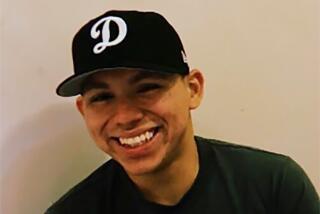Subway Gunman Could Be Reindicted by New Grand Jury : Judge Throws Out Goetz Assault Counts
- Share via
NEW YORK CITY — A state judge dismissed attempted murder and assault charges against subway gunman Bernhard H. Goetz Thursday but gave prosecutors the option of taking his controversial case to a third grand jury.
New York Supreme Court Judge Steven G. Crane Jr. ruled that prosecutors had committed “prejudicial error” when they instructed grand jurors about the legal claim of self-defense. Crane said also that prosecutors had withheld exculpatory evidence from the grand jury and that one of the witnesses might have perjured himself.
Faces Gun Charges
Goetz still faces three counts of criminal possession of a weapon and one count of reckless endangerment. The tall, thin 38-year-old electrical technician achieved international fame after he shot four young men who, he said, had tried to rob him of $5 in a Manhattan subway train on Dec. 22, 1984.
“He hopes the nightmare is over,” Goetz’s attorney, Barry Slotnick, said at a hastily called news conference. “It’s been a very painful year. Now, he just wants to regain his anonymity. He’d just like to go back to work, earn some money and become the introverted, quiet individual he was before this began.
“We’ve won a great legal victory,” Slotnick said. “Certainly, this is the most unusual case of the century.”
Manhattan Dist. Atty. Robert Morgenthau was studying the 35-page decision, according to spokeswoman Barbara Thompson. “We’re going to study it and decide whether to appeal it or represent to a third grand jury,” she said. “We believe our charge was correct.”
Slotnick said that he would call Morgenthau today and ask him to drop the remaining charges. Slotnick said he otherwise is prepared to defend Goetz, who, if convicted, could face up to eight years in prison.
Goetz’s legal case, and public opinion, have ridden a roller-coaster since he pulled a revolver from his pocket after one of the four youths asked for $5 in the subway.
“I have $5 for each of you,” Goetz replied, and began shooting. Two were hit in the back. Goetz turned to a third youth and shot a second time, saying: “You don’t look so bad. Here’s another.” He then fled down the subway tracks before police officers arrived and surrendered to police in Concord, N.H., nine days later.
“I responded viciously and savagely . . . just like a rat,” Goetz told a friend after the shooting. “I saw what was going to happen. I snapped.”
As public opinion swelled in his favor, a Manhattan grand jury on Jan. 25, 1985, refused to indict Goetz for attempted murder or lesser assault counts, charging him only with weapons possession.
Three of the four youths were brought before the grand jury, but none were willing to testify without immunity. Neither did Goetz testify before the grand jury, although his lengthy video-taped confessions were played.
As public opinion turned against Goetz, Morgenthau said he had found “new evidence.” He gave Troy Canty, one of the four shooting victims, immunity, and Canty told a second grand jury that he and his friends had tried to panhandle from Goetz, not rob him.
On March 27, the second grand jury indicted Goetz on four counts each of attempted murder and assault.
In dismissing those charges Thursday, Crane said that an assistant district attorney had issued improper instructions to the jurors about Goetz’s claim of self-defense. Crane said also that prosecutors did not present evidence from a police officer, Peter Smith, who said the wounded Canty had told policemen that “we were going to rob” Goetz. Another victim, Darryl Cabey, confirmed that account in a subsequent hospital room interview with the New York Daily News. Crane said that Canty “strongly appears” to have perjured himself before the grand jury.
Goetz’s case galvanized national attention. President Reagan was asked about it at a news conference, Time magazine gave him two cover stories and the BBC prepared a long documentary. A House subcommittee hearing focused on Goetz’s case.
Confined to Wheelchair
Of the four who were shot, Cabey, 20, suffered the most serious injuries. He remains hospitalized, paralyzed from the waist down, and doctors have said he will be confined to a wheelchair the rest of his life.
The other shooting victims were James Ramseur, 19; Barry Allen, 19; and Canty, 20. Ramseur and Allen are now in jail on unrelated charges; Canty is in a state drug treatment program.
Goetz recently said that he no longer rides the subways.
More to Read
Sign up for Essential California
The most important California stories and recommendations in your inbox every morning.
You may occasionally receive promotional content from the Los Angeles Times.














